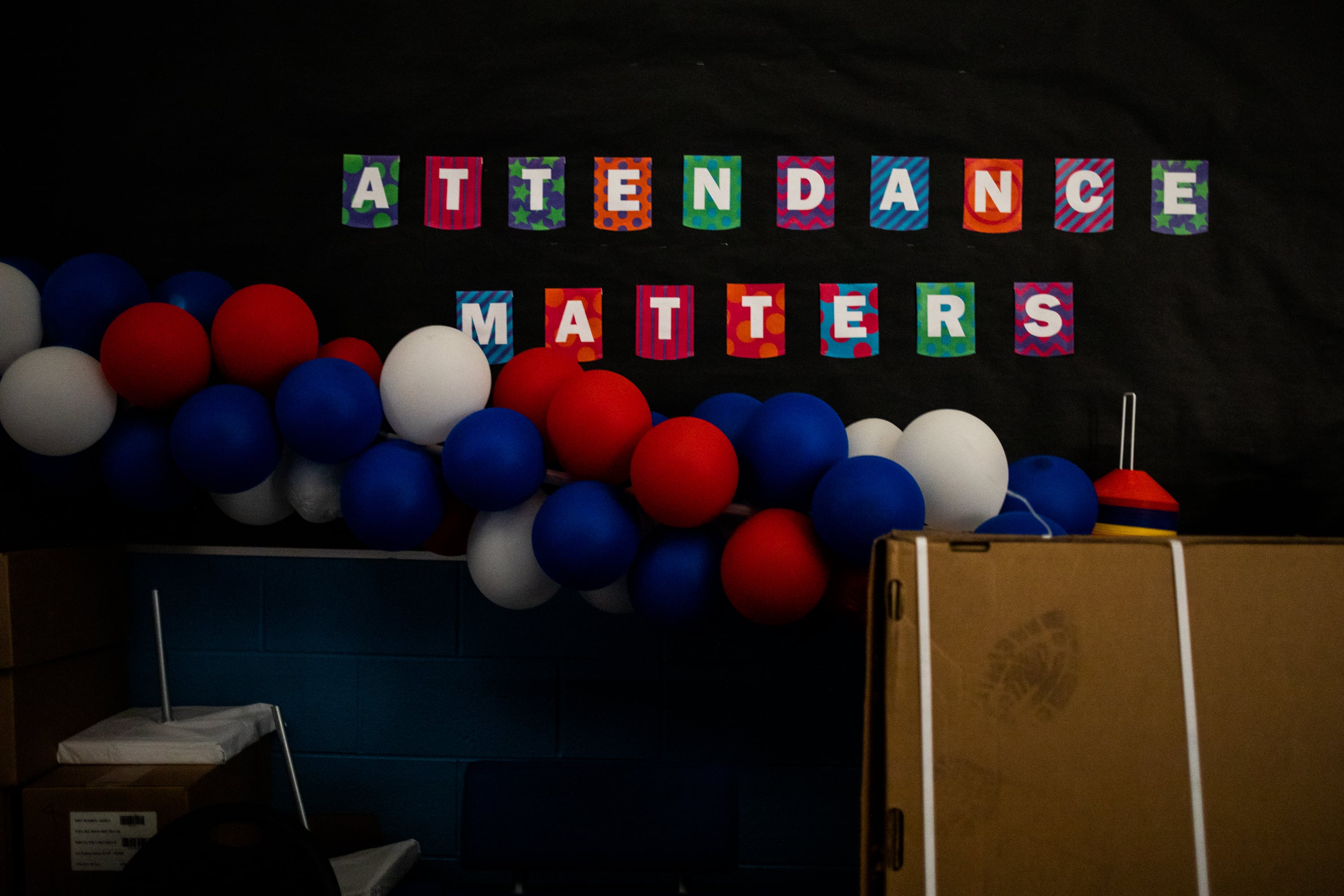Sign up for Chalkbeat Detroit’s free daily newsletter to keep up with the city’s public school system and Michigan education policy.
Walk into some classrooms these days, and the chronic absenteeism problem is clear. Some students are continually absent. Teachers are spending extra time catching up students who missed too many days.
Schools across the nation are dealing with a chronic absenteeism crisis, and it’s been particularly acute in Michigan. During the 2021-22 school year, the state had one of the worst rates of chronic absence in the nation. The rates improved the next school year, but still, 30% of students statewide are missing too much school.
Chalkbeat Detroit has prioritized reporting on chronic absenteeism for nearly two years because the stakes are high not just for schools but also for the students whose absences deprive them of an adequate education.
Over the course of our reporting, we have talked to parents who are struggling with a host of obstacles — health, transportation, work schedules — in getting their children to school. We heard from a mom who was afraid she would lose her public assistance because her daughter had too many absences. We also heard from students and parents who say transportation problems often lead children to miss school.
In the coming months, we’ll be working with 482Forward, a community advocacy organization, to further engage Detroiters on this critical issue.
Michigan schools are struggling academically. And while there are many ongoing efforts to improve achievement, they will falter if the chronic absenteeism problem isn’t addressed, both in schools and the community.
This guide helps parents understand the importance of attendance, ways they can get help, and the consequences if their children miss school.
How many kids are missing too much school in Michigan?
434,241.
That’s how many students across the state were considered chronically absent during the 2022-23 school year. The number amounts to nearly a third of the state’s public K-12 students.
What does ‘chronically absent’ mean?
Students are considered chronically absent when they miss at least 10% of the days school is in session. In a school year of 180 days, that is 18 or more missed days.
School officials monitor attendance on a daily basis, and if your child has missed more than a few days in a semester, you may hear from a teacher, an attendance officer, or even the principal. Their goal is to correct attendance patterns before students become chronically absent. Educators don’t wait until a student gets to 18 absences to intervene.
Why is chronic absenteeism a problem for students?
It’s simple. Every day a child doesn’t attend school is a day of instruction they are missing. Attendance Works, a national initiative that aims to reduce chronic absenteeism, says students can fall behind academically by missing just one to two days every few weeks.
Detroit Superintendent Nikolai Vitti often highlights the stark academic differences between students who are chronically absent and those who come to school regularly, with the latter group performing far better on state and local exams.
Chronic absenteeism has long been an issue in big-city districts. But the pandemic caused rates to soar in the U.S., in part because of quarantining rules but also because many students struggled with remote learning and mental health issues. Rates have improved in most states, but schools have had a difficult time recovering from the patterns that developed during the pandemic.
What about excused absences from school?
Students miss school for a number of reasons, including legitimate ones such as poor health or a family emergency. But whether an absence is excused or not, the end result is the same academically when a child misses school. That is why Attendance Works recommends that parents ask their child’s teachers “for resources and ideas to continue learning at home.”
What does Michigan law say about school attendance?
Michigan law requires, with a few exceptions, that parents send their child to school during the entire school year, from age 6 to 18. In Michigan, kindergarten is not required (though a bill was recently introduced that would make it mandatory). Exceptions to the attendance law include children attending private school, children being home-schooled, and children who have already fulfilled requirements for high school graduation.

What penalties do students face for missing school?
State law allows for charges against a student who “willfully and repeatedly absents himself or herself from school or other learning program intended to meet the juvenile’s educational needs.” In some cases, courts will try an intervention program first to try to resolve the issue. But if the absences continue, the student and/or parent will face a judge. Penalties range from a warning all the way up to being placed in a secure facility, such as a juvenile justice center.
What about penalties for Michigan parents?
Parents or guardians can face a misdemeanor charge if they fail to ensure their child is attending school. If convicted, they face up to 90 days in jail and/or fines of between $5 and $50.
Also, parents who receive public financial assistance for their children could have that aid withheld by the state if their children are chronically absent.
Why should parents keep track of their children’s attendance?
What do you do if you’re not sure your student is making it to school every day? In most cases, schools will call parents if their children are not present. But that doesn’t always happen, and some parents may miss those calls. But there are other ways to keep track. In the Detroit school district, for instance, you can access a Parent Portal daily to check your child’s attendance. Most school districts use something similar.
In addition to attendance, these portals also provide information to parents about how your child is doing academically. This way, there are no surprises when report cards come out, or when you attend parent-teacher conferences. If you are not registered with your school’s portal, check with the school office to get instructions on how to access it. If you live somewhere where the school doesn’t have an online portal, you can call the office to check on attendance.
Which students miss school the most days?
Students from low-income families have a chronic absenteeism rate of 41.8%. That’s far higher than the rate for their peers from wealthier families, which was 17.2%. But it underscores what research and experts have been saying for years: Poverty has an outsize impact on attendance.
Other demographic groups with high rates of chronic absenteeism include Black students, 53%; homeless students, 60%; and students with disabilities, 39%.
What if parents think their kids need a mental health break?
That’s a legitimate concern. We’ve heard from many students who say they’ve struggled to recover emotionally from the pandemic. Michigan lawmakers are listening. Proposed legislation would allow students to take up to five mental health days as excused absences.
But here’s the concern: They’re still missing school. So just as with an excused absence for physical health issues, parents should communicate with their child’s teacher to receive materials that will help their child stay on track on class assignments.
What do parents do if a school official, such as an attendance agent, comes to your house or leaves a message about absences?
In these situations, it is important to communicate with school officials so that they understand the reasons your child is missing school. You may be concerned that this could lead to punitive measures, but the reality is that school officials can connect you with resources that might help address the causes of attendance problems. Ignoring their attempts to contact you will make the situation worse for you and your child. Ignoring calls and visits while your child continues to be absent makes it more likely you or your child will face some punitive measures.
Where can families go for help?
Wherever you are in Michigan, it may be best to start with your child’s school to see if they can connect you with resources you need, whether it’s help with housing, transportation, food, or whatever else is making regular attendance difficult.
If you live in southeast Michigan, you can dial 211 to connect with the United Way of Southeastern Michigan’s helpline, which provides referrals for everything from food and housing to financial and utility assistance. The helpline services Wayne, Oakland, Macomb, Washtenaw, Monroe and Lapeer counties.
The Detroit Public Schools Community District website has a number of resources that connect families with food, housing and shelter, medical and mental health, financial assistance, or emergencies related to incidents such as domestic violence and child abuse.
Also in the Detroit district, families can seek help through the district’s Family Resource Distribution Center and through health hubs that opened this school year.
Lori Higgins is the bureau chief for Chalkbeat Detroit. You can reach her at lhiggins@chalkbeat.org.






